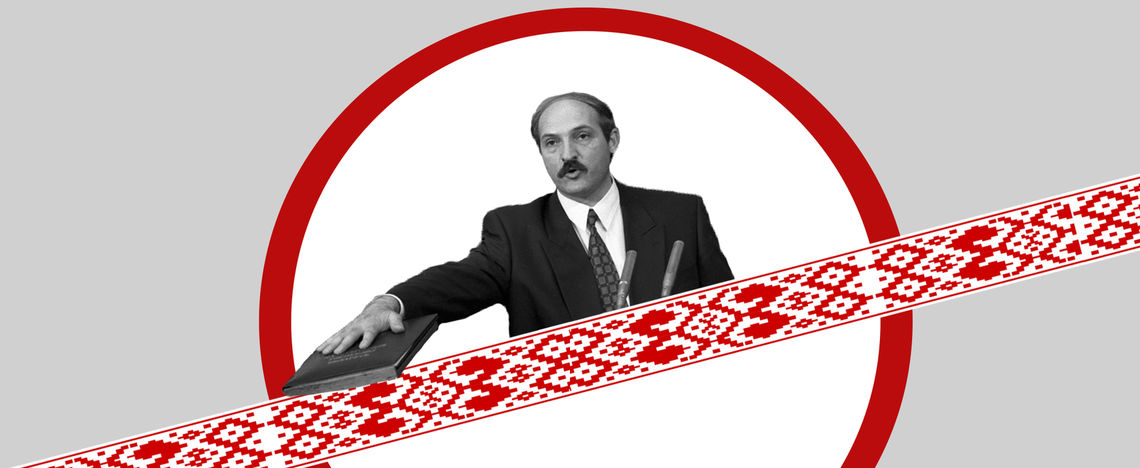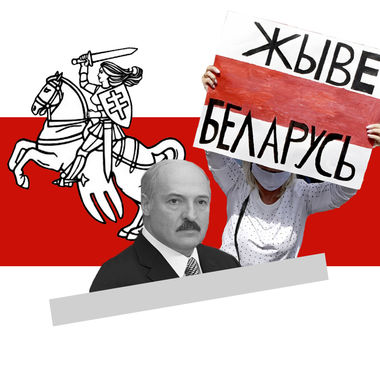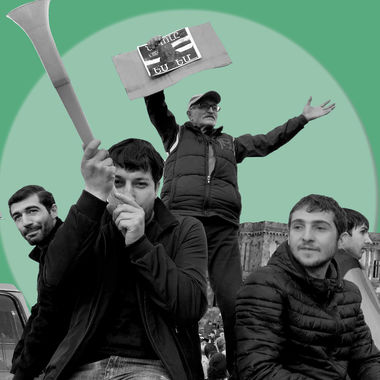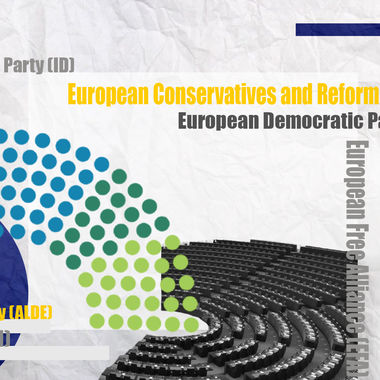Thu Sep 10 2020 · 7 min read
The Last Dictator of the European Continent and the EU
Belarusian Elections and the International Response

By Anna Barseghyan

Mass demonstrations have been raging in Belarus since the presidential election on August 9. Protesters remain adamant that Alyaksandr Lukashenka, who has been in the role for 26 years, not be allowed to take up a sixth term and maintain his hold on power for an additional five years. Official results from the Central Election Commission say that Lukashenka received 80.1% of the votes, on an 84% turnout, but the people on the streets aren’t buying it. Neither is Svyatlana Tsikhanouskaya, who declared that she won the election. Her own campaign’s data indicated support in the 70-90% range but the official results had her in second place, with only 10.1%. She has since sought refuge in neighboring Lithuania, fearing for her safety.
While Belarus’ partners in the Eurasian Economic Union (EAEU), including Armenia, have offered their congratulations to Lukashenka, Western governments have criticized the election. The US State Department expressed its deep concerns that the election was not free and fair. The official statement mentions that “Severe restrictions on ballot access for candidates, the prohibition of local independent observers at polling stations, intimidation tactics employed against opposition candidates, and the detentions of peaceful protesters and journalists marred the process. We regret that OSCE/ODIHR observers did not receive a timely invitation to monitor the vote. Free and fair elections, genuinely contested, are the basis for the authority and legitimacy of all governments.”
Similar views were shared from official Brussels. The day after the election, High Representative/Vice-President Josep Borrell (effectively, the EU’s Foreign Affairs Minister) and Neighbourhood and Enlargement Commissioner Olivér Várhelyi issued a joint statement in which they openly called out the electoral fraud by saying, “Following their unprecedented mobilization for free elections and democracy, the Belarusian people now expect their votes to be counted accurately. It is essential that the Central Electoral Commission publishes the results reflecting the choice of the Belarusian people.” They condemned the violence against peaceful protesters and indicated that further relations with Belarus will be based on how the situation develops.
The Belarusian Helsinki Committee and the Viasna Human Rights Center had conducted an independent election observation mission. Their preliminary report spelled out the infractions that led to the calls for Lukashenka’s removal: “The 2020 presidential election was held in an unprecedented atmosphere of fear and intimidation of society, against the backdrop of repression, which began almost immediately after the announcement of the election and marred every electoral phase. As a result of this repression, more than a thousand citizens were subjected to arrests, while hundreds were sentenced to short terms in prison or fined. Criminal cases targeted 23 people, including direct participants in the election: members of nomination groups and presidential nominees, as well as bloggers and participants in peaceful protests and pickets held to collect support signatures. All of them were called political prisoners by the Belarusian human rights community." While they did observe the campaign environment, civil society groups were prevented from observing the counting of votes, adding to the lack of transparency that cast its shadow over the entire electoral exercise.
Relations Between the EU and Belarus
Following the developments in Belarus, Josep Borrell held a video conference with the Ministers of Foreign Affairs of the 27 EU member states on August 14. The ministers sent a strong message to the Belarusian population not to give up on their desire to achieve a democratic milestone. The EU is committed to supporting the process in light of the marred nature of the election; they expressed readiness to be the negotiator between the political authorities and the opposition. The three Baltic states of Estonia, Latvia and Lithuania banned Lukashenka and 29 other high-ranking Belarusian officials from entry to their countries.
The ministers also agreed on the need to sanction those responsible for violence, repression and the falsification of the election results. In upcoming meetings, the EU will discuss measures such as enhanced engagement with and financial support to civil society, additional support to independent media and increasing opportunities for student and academic mobility.
While the EU’s support for the protests are evident, there is not unanimity on the effectiveness of sanctions. Germany, France and Italy believe that “channels of communication with Lukashenka must be kept open under all circumstances,” which would preclude blacklisting him.
In solidarity with the people of Belarus, several marches have taken place in different European capitals, in front of Belarusian embassies. Such activism is a new development and did not have an equivalent during similar mass protests in Armenia in 2018.
This time, the EU's assessment is critically different from that of Belarus’ 2015 presidential election, when Lukashenka was awarded 84% of the vote. The High Representative of the EU for Foreign Affairs and Security Policy at that time, Federica Mogherini, emphasized that the election had taken place in a “peaceful environment” and offered assistance to Belarus “in its efforts to bring its election process in line with OSCE commitments and other international standards for democratic elections.”
Since the late 1980s, the EU’s efforts to transform Central and Eastern Europe into members of the democratic club have been mostly successful. The biggest exception is Belarus, which has earned the moniker of “the last dictatorship in Europe.” EU-Belarus relations have had their ups and downs since Belarus obtained its independence in 1991. Belarus is the only post-Soviet country with whom the EU didn’t conclude a Partnership and Cooperation Agreement (PCA) after the collapse of the Soviet Union. Though one was signed, it was never ratified due to Lukashenka’s backsliding into communist habits. The EU tried to maintain a balance between creating opportunities for the people of Belarus and restricting relations with its authoritarian regime. Nevertheless, the lack of even lip service to democracy hindered deeper cooperation.
The situation hasn't improved until now. After every election, the gap between the European institutions and Belarus only became wider. Initially, the EU had a very limited interest in Belarus and tried to keep the formula of a relationship without compromising the EU's commitment to democracy. In the early 2000s, the European Council imposed visa bans on key actors associated with the disappearance of political activists in 1999 and 2000. Sanctions were extended against individuals responsible for the fraudulent parliamentary elections of December 2004. Notwithstanding the deteriorated relations, Belarus requested the start of visa negotiations in 2004-2007 but the EU stayed firm: no visa talks in the absence of political reforms. It was not until 2014 that the EU launched negotiations on Visa Facilitation and Readmission, for the sake of the Belarusian people. It was finally signed in January 2020. Due to these agreements, the procedure to obtain a European visa became easier for Belarusian citizens, with fewer required documents. Armenia had concluded similar agreements with the EU in 2014.
In June 2007, Belarus was deprived of one more opportunity when the EU withdrew a preferential trade regime (called the Generalized System of Preferences, or GSP) as a response to violations of worker rights. The move increased tariffs on 10% of Belarusian goods entering the EU. A dialogue was restarted in October 2016 but has yet to yield results.
After the EU's largest enlargement in 2004, it became an immediate neighbor to Belarus. Even so, over the last 16 years, the EU strictly banned any high-level contacts with the Belarusian government and initiatives by central European EU member countries to hold meetings with the Belarusian authorities were strictly criticized.
Any small move from the Belarusian side was much appreciated in Europe. For instance, when Lukashenka decided to release several political prisoners in 2007, the EU finally decided to open a delegation (embassy) in Minsk. However, such honeymoons only ever lasted until the next parliamentary or presidential elections, which consistently suppressed the opposition. In 2009, together with five other states (Armenia, Azerbaijan, Georgia, Moldova and Ukraine), Belarus became a member of the EU’s Eastern Partnership. The 2008 Russian-Georgian War was a pivotal turning point. Despite pressure from Moscow to recognize Abkhazia and South Ossetia as independent states, Belarus remained officially neutral. Lukashenka cited Russia’s refusal “to share negative consequences, expected for Belarus from the West in case of such a decision.” Similarly, throughout the Ukrainian conflict, Belarus tried to play the role of fair dealer between Moscow and Kyiv.
These positions were much appreciated by the European side. In 2016, the European Council decided to lift restrictive measures that dated back to 2004 against 170 individuals and three companies, while maintaining its arms embargo and sanctions against four persons. On February 17, 2020, the Council decided to prolong the restrictive measures against Belarus for one more year.
While much remains to play out, it is obvious that the people of Belarus are not backing down in their fight for their natural right to live in a democratic and free country. As highlighted by the European Council of Foreign Relations, “Under the best of circumstances, the Armenian revolution could provide a template for Belarus.” Toward that end, there is a need to emphasize that the movement in Belarus is not a geopolitical struggle; it centers on the domestic issue of crafting a better future for the Belarusian people.
also read
Civic Resistance in Belarus: The Strong Voice of a Tired Country
By Ales Plotka
The main catchphrase this month in Belarus is “We don’t want a Ukraine scenario, we want an Armenia scenario,” writes Ales Plotka about the ongoing protests in Belarus following fraudulent presidential elections in August.
Was the Revolution Justified?
By Simon Clarke
Was there just cause for the Velvet Revolution on substantive or procedural grounds? Dr. Simon Clarke applies a number of principles to the events that took place in Armenia earlier this year to determine whether the revolution was justified.
Armenian Political Parties’ Affiliations With Their European Counterparts
By Anna Barseghyan , Harout Manougian
Several political parties in Armenia are members of officially registered European political parties in the European Parliament. This affiliation offers an opportunity to deepen international cooperation and conduct parliamentary diplomacy.
Velvet Revolution: The Moments In-Between
In 2018, the Armenian people were swept up in a nationwide movement that would come to be known as the Velvet Revolution. Photojournalist Eric Grigorian took thousands of photos, documenting and capturing images of ordinary people who came together to achieve the extraordinary. Through his own words, Grigorian tells the story of the revolution and the moments in-between.






EVN Report welcomes comments that contribute to a healthy discussion and spur an informed debate. All comments will be moderated, thereby any post that includes hate speech, profanity or personal attacks will not be published.